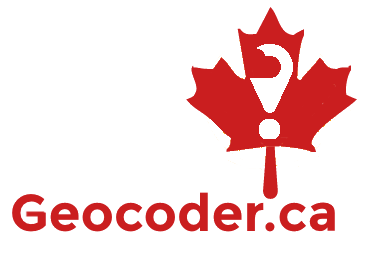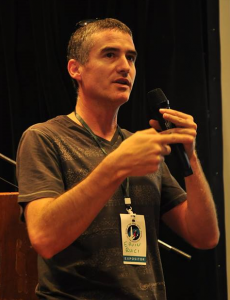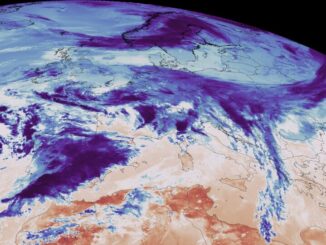
Have you ever felt the wrath of a Canadian Crown Corporation? In 2011 Canada Post set its sights on Ervin Ruci and by 2012 had sued him personally for copyright infringement. The copyright Canada Post believed he had violated was the postal codes that we all use and share. In 2005, while still a student, Ervin crowdsourced postal code data in order to have the data available for use in geocoding. He began to provide free access to that data on his website http://geocoder.ca.
Ervin Ruci is a self described math geek cum data scientist. He first came to Canada as a student from Albania in 1996 in order to attend Mount Allison University in Sackville, New Brunswick. Graduating in 2000 Ervin went to work for the Canadian Internet Registration Authority (CIRA) until 2005. After which Ervin became a graduate student at Carleton University. He graduated in 2007 with a MSc in Computational Geometry.
In 2005, while a graduate student, Ervin decided he wanted to provide one of the first free geocoders to the global community. It was this work that got him into trouble with Canada Post. Geocoding is the process of assigning locations to addresses so they can be placed as points on a map. The process assigns geographic coordinates (Lat & Long) to the original data, in this case Canadian Postal Codes, hence the name geocoding.
In 2007 Ervin incorporated the Geocoder.ca website that provided his Geocoding service under the name Geolytica Inc. After many years of successful business providing geomatics services Ervin was able to move back to Albania and work remotely on Geocoder.ca. He came back to Canada in 2012 and that’s when this story began.
The case against Ervin and is company has now been settled. GoGeomatics interviewed Ervin a few days after he learned his ordeal was finally over.
GoGeomatics: Hi Ervin, thanks for talking to GoGeomatics Canada. Lets get to the heart of the matter. Why was Canada Post suing you?
Ervin Ruci: Canada Post had come after me because I was offering a crowdsourced geocoded postal code list on my website, geocoder.ca, Canada Post was suing to enforce their alleged intellectual property rights on Canadian Postal Codes and their compilation. They were also suing to enforce their trademark “Postal Code”, a word pair which they thought I was using without permission on my public website.
GoGeomatics: When did they bring the lawsuit?
Ervin Ruci: First they sent me a cease and desist letter in 2011. The letter stated that any use of a postal code other than for sending mail via Canada Post, was copyright infringement. A copy of that letter is here: http://geocoder.ca/CP_Cease_and_Desist.pdf
I had been living overseas and came back to Canada in March 2012. I was still jet-lagged when I was served with a copyright infringement lawsuit brought by Canada Post against my company Geolytica Inc. Initially I was not named personally as a defendant in the lawsuit. That came later.
GoGeomatics: How did the lawsuit affect you and your business?
Ervin Ruci: The lawsuit brought about by an entity with seemingly limitless resources cast serious doubt on the survival of my company. Several long time clients stopped using our API under the fear that “it will not be around for long”. And they were not the only ones looking at the “little guy” with suspicion. Even the Royal Bank of Canada, where “Geolytica inc.” had a business account since its inception, cancelled the company’s line of credit because, in their own words, “I was a high risk client being sued by a crown corporation.”
I have scanned and posted some letters of rejection from that time from financial institutions and companies that had nothing to do with Canada Post, but were simply assuming that in this legal battle there could only be one loser, me. Needless to say, this caused a lot of stress in a time of transition for me and my family, having just relocated back to Canada from Albania.
GoGeomatics: Who helped with your legal defense and who supported you in the Canadian geomatics community?
 Ervin Ruci: The Open Street Map (OSM) community which was by now using my crowdsourced database of postal addresses in openstreetmap.org , as well as other non-profits and government agencies who were beneficiaries of my free databases and public APIs, and many individuals in the Canadian geomatics community were my first witnesses in the court of public opinion. (A partial list of their names is at this url: http://geocoder.ca/?legalfeedback=1 )
Ervin Ruci: The Open Street Map (OSM) community which was by now using my crowdsourced database of postal addresses in openstreetmap.org , as well as other non-profits and government agencies who were beneficiaries of my free databases and public APIs, and many individuals in the Canadian geomatics community were my first witnesses in the court of public opinion. (A partial list of their names is at this url: http://geocoder.ca/?legalfeedback=1 )
My legal defense team was provided by the Canadian Internet Policy and Public Interest Clinic (CIPPIC). They acted as my counsel and drafted the first statement of Defense. Then RIDOUT & MAYBEE LLP law firm took on the case “pro bono.” Without their pro-bono legal representation I’d have declared bankruptcy. The community also came out strongly in my support, helping me with donations, because even though I did not have to pay the lawyers, litigation in the federal court involves other expenses which had to be covered by me. They also provided moral support and raised public awareness of the issue and what was at stake if Canada Post won.
GoGeomatics: Did you spend anytime in court testifying? If so what about?
Ervin Ruci: I went to testify several times during the discovery legal procedure. For example, I provided a complete copy of my email, server logs. etc. I had server logs going back several years which showed how the data was crowdsourced. I did that by showing the IP address of the individuals using the geocoder.ca website or API, and the postal address that was submitted by them for geocoding. In court I explained this process in detail and this might have helped convince them that my data was in fact, crowdsourced.
GoGeomatics: What was the legal argument that Canada Post was trying to make?
Ervin Ruci: They were saying that creating a postal code requires specific skill and judgement, making a postal code a copyright protected item under the copyright act. They were also casting doubt as to the origin of my data, saying that geocoder.ca had such an almost complete database of postal codes, that it must have been copied (in full or in part) from their official postal code address list. Later on, when they updated the lawsuit to name me personally as a defendant and added a trademark infringement lawsuit, they were also trying to argue that the word pair “postal code” was an official mark of Canada Post, and I was using it on my website without their permission.
GoGeomatics: Why is it important that postal codes in Canada are free for everyone to use?
Ervin Ruci: Postal codes are facts everyone has gotten accustomed to. A lot of people remember and enter their postal code or street address or both, to access certain services. For example, I enter my postal code in a voting advocacy group’s website to read more about where to vote and the various alternatives. These facts (postal codes) are the same as other facts established by government policy (say street addresses, city names, etc) and should not be owned by any for-profit entity. Why? Because that would place them in a monopoly position that is not in the public’s interest. While it is true that the federal government has placed Canada Post in charge of assigning postal codes to street addresses, I can’t see how the government would give them exclusive rights to this information, which as a result of government policy is now public information, and as such it must be open and free for everyone to use.
GoGeomatics: Why were they wrong?
Ervin Ruci: They are still wrong. Because, even though they now recognize that their claim against me, someone who simply compiled a list of facts and made them available, would have a pretty tough chance being upheld by the courts, they have not given up their copyright claims to Canadian postal codes – yet. They might sue again to maintain their monopoly position, which is somewhat weakened by the conclusion of this case. But, they are still holding on to what they consider as one of their intellectual property assets. Because, by settling instead of seeing this case make its way through the courts, they avoided a precedent setting court decision which would have prevented them from trying to aggressively enforce these alleged intellectual property rights in the future.
GoGeomatics: What finally convinced Canada Post drop the case and settle with you?
Ervin Ruci: They were convinced that my data was crowdsourced over many years from millions of individual contributions. The evidence is there for everyone to see. On top of that, they must have recognized a major weakness in their case, which in my opinion is the difficulty in arguing copyright and trademark rights over postal codes and their names, when in theory, even if such copyright exists, it rests with the Queen of Canada, who to my best knowledge has not transferred such rights over to Canada Post.
GoGeomatics: When did you realize that Canada Post was having second thoughts?
Ervin Ruci: Canada Post expressed a strong desire to settle after the last federal election, in November and December I noticed that their position was very much changed compared to before.
GoGeomatics: Can you tell us anything about the settlement?
Ervin Ruci: The terms of the settlement are confidential, but we have a mutually agreed statement that can be shared with the press.
“Canada Post commenced court proceedings in 2012 against Geolytica Inc. for copyright infringement in relation to Geolytica Inc.™ Canadian Postal Code Geocoded Dataset and related services offered on its website at geocoder.ca. The parties have now settled their dispute and Canada Post will discontinue the court proceedings. The postal codes returned by various geocoder interface APIs and downloadable on geocoder.ca, are estimated via a crowdsourcing process. They are not licensed by geocoder.ca from Canada Post, the entity responsible for assigning postal codes to street addresses. Geolytica continues to offer its products and services, using the postal code data it has collected via a crowdsourcing process which it created.”
GoGeomatics: Now that the lawsuit is over what is the future of Geocoder.ca?
Ervin Ruci: Geocoder continues to innovate in the area of named entity parsing and geocoding. We’ve released a new API which internally has been re-designed from the ground up and we are testing at http://geocode.xyz, a Geocoding service for Europe, which is a good test case for our parsing algorithms taking into account the various languages and alphabets/character sets we must work with in the old continent.
Our slogan is now changing to “Putting the world’s information on a map” with the upcoming release of openwikimap.org, a service that will extract locations from wikipedia and other websites from the common crawl project, to geocode and annotate this information on a map.
As far as postal codes go, that’s always been a by-product of our work which we share with the public to showcase the high quality of our geocoding services. We will continue to crowdsource postal codes, until the day this data is finally open by the Canadian government. And, by the way, we are now crowdsourcing the postal codes of other countries as well (countries that like Canada keep this information closed). A list of crowdsourced UK post codes is going to be released on geocode.xyz soon.
GoGeomatics: How do you feel now that it is over?
Ervin Ruci: Relieved. There was always a fear in the back of my mind that the court might side with the stronger of the two parties, and all this work would go to waste.
GoGeomatics: What does the result of your case mean in terms of Open Data and crowdsourcing for Canadians?
Ervin Ruci: There is even more pressure now on the Canadian government to open up postal address data. This also means that crowdsourcing works! If not by completely bringing down data monopolies, by making them less of a monopoly.
GoGeomatics: Ervin thanks for taking the time to talk to the GoGeomatics Canada Community. Let us know if you hear from Canada Post again and best of luck in the future.





Be the first to comment